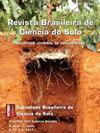Application of organic and mineral fertilizers increases carbon fractions in two classes of aggregates in an Integrated Crop-Livestock System
IF 2
4区 农林科学
Q3 SOIL SCIENCE
引用次数: 0
Abstract
: Application of organic fertilizers of animal origin can increase organic carbon in the soil and increase its content in macroaggregates. This study aimed to evaluate carbon contents and fractions in two classes of soil aggregates in response to the application of organic and mineral fertilizers in an integrated crop-livestock system. The experiment was established in Concórdia, Santa Catarina State, in a Nitossolo Vermelho Eutroférrico típico , (Rhodic Kandiudox according to the WRB system) (0.00-0.05, 0.05-0.10, and 0.10-0.20 m), in an integrated crop-livestock, with corn and soybean in the summer, black oat and rye in the winter, shepherded by sheep. The design used was randomized blocks, with treatments in factorial design (5 × 3 + 1), with four replications, five sources of fertilizers, three rates and the control with no fertilization. Three organic fertilizers were applied: poultry litter, pig manure and compost; and two minerals fertilizers: M1 (formulated according to the composition of the pig slurry) and M2 (adjusted according to the composition of the poultry litter), combined with three applications rates, corresponding to 75, 100 and 150 % of the recommendation for the crop of interest, based on the element with greater demand. Total organic carbon (TOC), particulate (POC) and mineral-associated organic carbon (MAC) contents were determined in two classes of soil aggregates C1 (8.00 to 4.76 mm) and C2 (4.76 to 2.00 mm), in samples collected in the 2018/2020 crop season. Crop yields were determined in every season. The results were analyzed using analysis of variance to compare sources and polynomial regression analysis for fertilizer rates. The soil has high aggregate stability, even so, the use of organic and mineral fertilizers increased aggregation. The poultry litter organic fertilizer increases aggregation, forming largely aggregates with a size of 8.00-4.76 mm, and increases the contents of total fractions of soil organic carbon, providing the system with a more stabilized carbon. In the 0.00-0.05 m layer, organic fertilizers increased the content of total organic carbon. The stabilized fraction (MAC) showed a higher proportion of total soil organic carbon than particulate organic carbon (POC).施用有机肥和矿肥增加了作物-牲畜综合系统中两类团聚体的碳组分
本文章由计算机程序翻译,如有差异,请以英文原文为准。
求助全文
约1分钟内获得全文
求助全文
来源期刊

Revista Brasileira De Ciencia Do Solo
农林科学-土壤科学
CiteScore
3.00
自引率
11.80%
发文量
32
审稿时长
9-24 weeks
期刊介绍:
The Revista Brasileira de Ciência do Solo is a scientific journal published by the Brazilian Society for Soil Science (SBCS), founded in 1947, and is responsible for the propagation of original and inedited technical-scientific work of interest for Soil Science.
Contributions must not have been previously published or submit to other periodicals, with the only exception of articles presented in summarized form at professional meetings. Literature reviews are accepted when solicited by the Editorial Board.
 求助内容:
求助内容: 应助结果提醒方式:
应助结果提醒方式:


